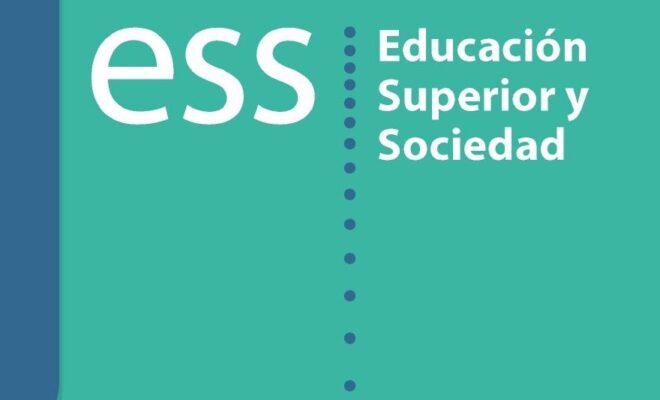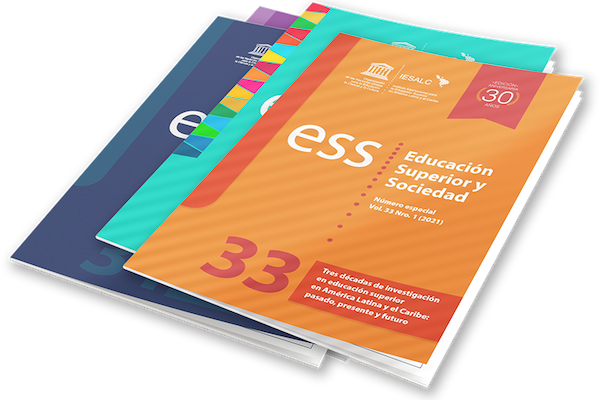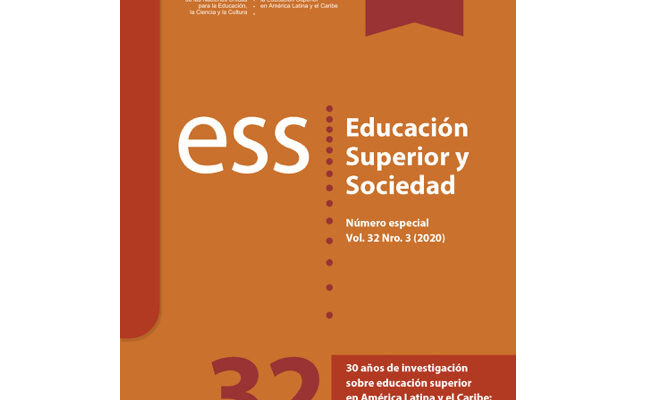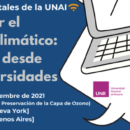Higher education in Latin America and the Caribbean, present and future

By Ana Lúcia Gazzola | First of all, I would like to talk about my joy at participating in this IESALC event, in celebration of the 30th anniversary of the Higher Education and Society journal. At IESALC I have consolidated myself as a Latin American and I want to pay tribute to all those who have worked with me, whether at the institute or as members of the university community in our region, particularly in the organization and realization of CRES 2008. Today, 13 years later, I can measure the structuring impact of IESALC in my life and I express my gratitude.
Today we celebrate the thirtieth anniversary of our magazine, a true phoenix, which sometimes falls apart but always rises again with more strength. This is how we brought it to life during our period at IESALC and today it is consolidated, strategically contributing to the reflection and debate on higher education in Latin America and the Caribbean (LAC) and in the world. Now, more than ever, with the disruption caused by the pandemic, the challenges of the 4.0 revolution, the entry of new actors in higher education in the world and the challenges specific to our region, proactive reflection as well as regional articulation are necessary in order to address common problems. The role of IESALC is fundamental and I would like to acknowledge the work being developed by the current management.
Today it is my turn to speak about the future of higher education in Latin America and the Caribbean. I could begin with a diagnosis, but we are all tired of this. Not because it is not important, but because we have already had enough, such as those prepared and permanently updated by IESALC, by the three CRES carried out in the region and the various sectorial and national diagnoses. For this reason, I want to go on to highlight some points that seem relevant to me and that cause me constant anguish.
One question has accompanied me over the years: if we know what to do to overcome educational asymmetries in our countries and among them, as well as between LAC and other regions of the world, why are the necessary and relevant public policies not being implemented with continuity?
I will venture to present a preliminary answer. I refer to what I consider to be the four cancers that, in my opinion, generate disruption and instability in our countries and prevent higher education from being transformed into truly republican state policies.
In the first place, the nefarious interest of the elites, who are interested in the concentration of privileges and therefore try to stop the transformative impact of education, science and technology in society, which explains the constant attacks on public higher education institutions and the commitment to privatization. The second factor is corruption, which corrodes resources and generates a permanent ethical and moral crisis. The third is corporatism within the institutions, which has a legitimate dimension, but does not always defend the necessary changes to redefine higher education in our society, even in the governance of the institutions. And, finally, the discontinuity in public policies for education, science, technology and innovation, so that with each government in office there are impacts that do not guarantee the continuity of stable regulatory frameworks and resources.
Another relevant point, perhaps minimized by the pandemic, is the fact that our societies do not understand the strategic role of higher education and science, technology and innovation. Most of the region’s businessmen prefer to import technology rather than partner with our knowledge-producing institutions to promote research and development, or P&D, as it is called in Portuguese. Many of the region’s governments adhere to the World Bank’s vision of education, which establishes that developed countries have the role of producing and exporting higher education and that developing countries have the role of consumers, so that they should concentrate on financing basic education. Without denying the importance of focusing on basic education, this cannot be the exclusive aspect of concern, because it would compromise our sovereignty in the knowledge society and aggravate our dependence, as the pandemic has shown. Although we can count on a body of highly qualified and committed scientists and intellectuals, our industrial parks are precarious and outdated, the university-industry relationship is not consolidated, resources are insufficient and unstable, there is a lack of support for the training of cadres and their insertion in production systems. All this hinders the transfer of knowledge for the promotion of innovation and results in brain drain.
In addition, as ironic as it may seem, LAC is a disjointed region. We have promoted three regional conferences and we are the only region that has held a Regional Conference on Higher Education before the next World Conference. But our actions, as countries and as higher education institutions, are fragmented and we do not present ourselves to the other regions as a bloc defending common interests. Not even in the pandemic of the new coronavirus have we been able to face this disease that does not recognize national borders, together! Of course, there are specific initiatives, but we need to implement a regionalized and supportive international articulation that optimizes our national resources in an integrated and strategic way.
For all these reasons, I would like to discuss the challenges we face in higher education in the region and which should lead us to rethink action strategies for the future in order to, as expressed in our journal’s name, impact and transform society through education, particularly higher education.
The first challenge is with respect to what seems to me to be the main tension facing higher education in LAC. We recognize that we are facing the most impactful and disruptive technological transformations in human history: the 4.0 Revolution, with the combination of robotics, big data, biotechnology and new materials, among other advances. All of this impacts higher education and requires a new vision of the skills demanded by the 21st century, which requires the use of new educational methodologies outside our comfort zone. Considering the digital gaps, which must be urgently overcome, a new role is needed for teachers, as well as for students. The latter must be encouraged to assume their learning process and their future in order to develop their creativity, critical spirit, leadership, entrepreneurial action and ability to face problems and uncertainties. In other words, their autonomy, the ultimate goal of education, which is possible when one learns to learn and to unlearn in order to learn throughout life. In this process, the teacher is a mentor, a road map, a compass to support the student. We cannot stop looking for the development of the so-called soft skills and we must discuss their impact on curricula and evaluation models.
But I want to highlight another dimension: how to build this sophisticated building since, as a region, we do not have solid foundations and have not overcome structural problems such as illiteracy, coverage, retention, desertion, quality and inclusion? In higher education, it is our responsibility to eradicate total and functional illiteracy, even cultivated in our networks, where 80% of students may have no reading, writing or math skills after more than three years in school. We know, as the recent IESALC study has shown, that the crisis has been aggravated by the pandemic in terms of lack of access to remote activities.
We talk about equity and inclusion, but we are far from achieving them. We certainly need to develop soft skills, but without leaving anyone behind. Our greatest challenge is to achieve this and at the same time overcome the structural and structuring gaps in education, always taking into account intercultural education and the dialogue of different types of knowledge.
It is obvious that higher education institutions do not have the power to establish public policies. But we must try to influence them. If, as countries and as a region, we do not solve this, the gaps between us and the developed countries will deepen, as is already happening in a forceful way during the pandemic. Quality education will be less and less inclusive and therefore will cease to have quality; it will cease to be the social public good and universal right that it should be. There is no way to talk about quality if it is not for everyone! Without inclusion, we are talking about privilege and not quality. In other words, the two extremes must be on the agenda of higher education in LAC. The wheels must be changed while the plane is still in flight and the speed must be accelerated!
Another extremely strategic issue for our region is the broadening of the concept of extension, which is often understood exclusively as an action of social or cultural impact or as the provision of services. Extension should include the dimension of knowledge transfer to promote innovation. For this to occur, three pillars are necessary: the institutions that produce and transfer knowledge; the government, which acts or should act as a facilitator; and the production system, in which innovation occurs. It is important to emphasize that innovation does not occur only in companies, but also in governments (in management processes, for example) and in society as a whole, since it includes educational and social technologies. Innovation is the driving force behind development and must always take the social benefit and environmental impact into account.
In the case of our higher education institutions, the possibility of promoting innovation requires changes in institutional structures, norms and cultures in order to do so without compromising the identity of the university and its other missions, which are training, research in all areas of knowledge and outreach with social and cultural impact. It is an expansion of the mission, not a change. In the same way that the university is not a diploma factory, neither can it be reduced to a market-driven service provider.
The mission of higher education has long-term objectives, such as, through research, to answer questions not yet formulated. Its mission is also to educate full citizens, with values based on universal humanism and respect for diversity, empathy, solidarity, fundamental rights and the environment. Just as education is a social public good, that is, it belongs to everyone, so is knowledge a public good that should benefit all humanity.
A third point in the direction of the future of higher education in LAC must be solidarity-based cooperation. We already work in an articulated manner among institutions, but we must do so more, not on an ad hoc basis, but systematically and strategically. As a region, we must establish joint strategic goals and build programs that will enable us to achieve them. Joint postgraduate programs, mobility of teachers, directors, students and technical and administrative personnel, research networks, publications of regional impact such as the Higher Education and Society journal, and others. We must promote these actions within the scope of joint planning, with medium and long term horizons. The questions we must try to answer in the implementation of these actions are: What university do we want to be in the future? What society do we want to build? What world do we want for future generations? And how should higher education contribute to make that world possible?
In recent times I have heard from several colleagues that the traditional university is doomed to disappear. New players have emerged, such as the technological giants, and online and distance education is expanding. They propose that the university should be radically transformed, to the point where it could be destroyed, I believe, by ceasing to be what it is.
I do not share this vision, which I consider apocalyptic and perhaps opportunistic. I believe that the on-site university, as a place of physical and spatial coexistence, will not cease to exist, because it is necessary for society and human development. It is a place for listening and learning dialogue, tolerance and essential values for the survival of humanity. But yes, it must redefine its mission, keeping it in total harmony with the present and open to the future, extending its impact as it has done throughout its almost millennial history, going from being an exclusively educational institution to include research, then extension and now innovation. Being enterprising and innovative is what has guaranteed its permanence for almost a thousand years. We must always move forward and that is part of the nature of the University, although sometimes changes occur more slowly than we need them to.
The university, throughout its history, is based on the belief that the search for knowledge and the free use of reason are the best foundations for the edification of human society. That is why the university seeks to preserve the knowledge accumulated by humanity and such belief is the basis for its intervention in the present and its acceptance of the questions of the future. If we were to displace the experience of the university – the always historical search for more knowledge – from the central place it occupies and enthrone other institutions, religious creeds, political parties, national or multinational corporations, our civilizational course would be different. The university educates, not only informs. This is the difference between it and the other higher education actors that have appeared on the scene. The university educates and must always form a full citizenship, with a global vision and local commitment. This is the way to confront obscurantism, intolerance and violence. The university is a civilizing force, and the reason it defends is what makes legitimate the belief that men and women can aspire to build our destiny autonomously as individuals and as societies. The diverse and fruitful knowledge that we welcome and develop at the university, which is accomplished by training people, strengthening values, and producing knowledge, is essentially a process of humanization that is indispensable in the always-renewed struggle against economic and cultural misery. Therefore, I do not foresee the end of the university, but its renewal, to face the greatest challenge: a qualified, relevant, inclusive and socially referenced education for everyone.
Finally, I will resort to paraphrase St. Augustine to express my deep belief that the university is our passport to the future. He says that time is unique and that there is no past, present or future. The only time is the present: the present of things past, the present of things present and the present of things future. Perhaps we can speak, through St. Augustine, of the university. The present of things past, which he calls the memory, would be the role of the university in preserving all the knowledge produced by humanity. The present of things present is the gaze, the vision, and would be the permanent intervention of the university in formation and extension. And St. Augustine concludes that the present of future things is hope. Cultivating hope, I believe, is the most important mission of the university which, through research, looks to the future; always open to seek answers to questions that we do not yet know. This is the utopia of reason and freedom, the ultimate and constitutive purpose of the university.
Photo by Greg Rosenke on Unsplash
RELATED ITEMS







